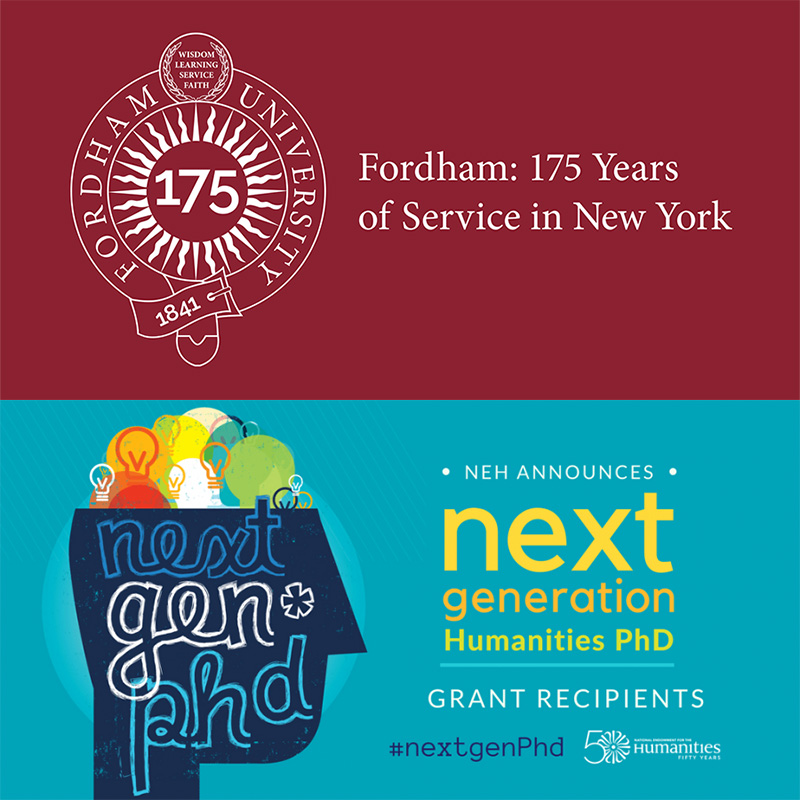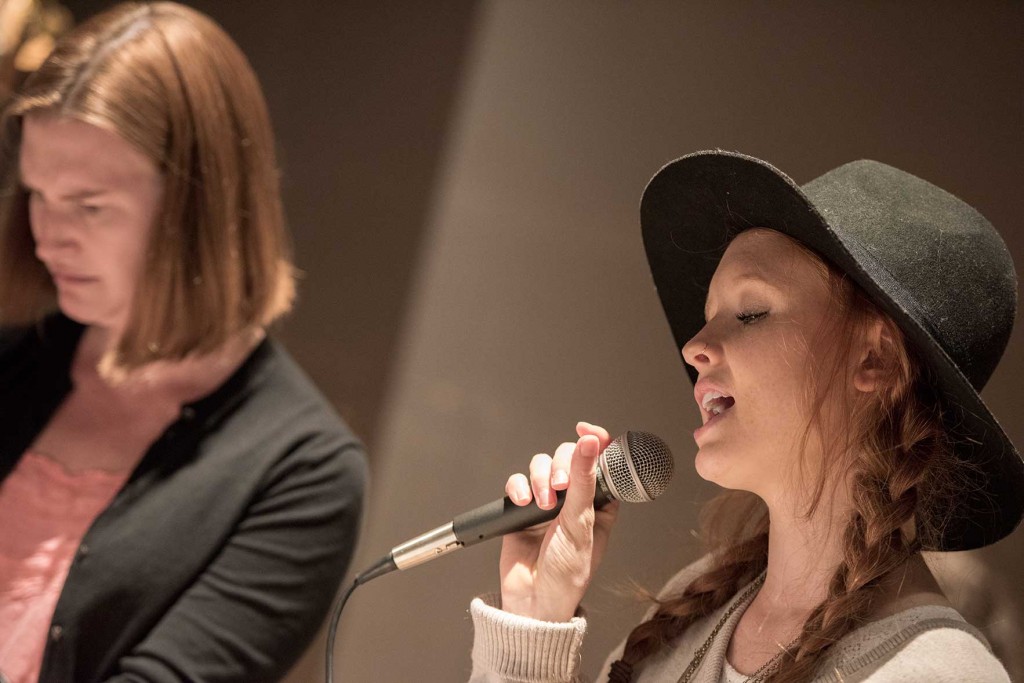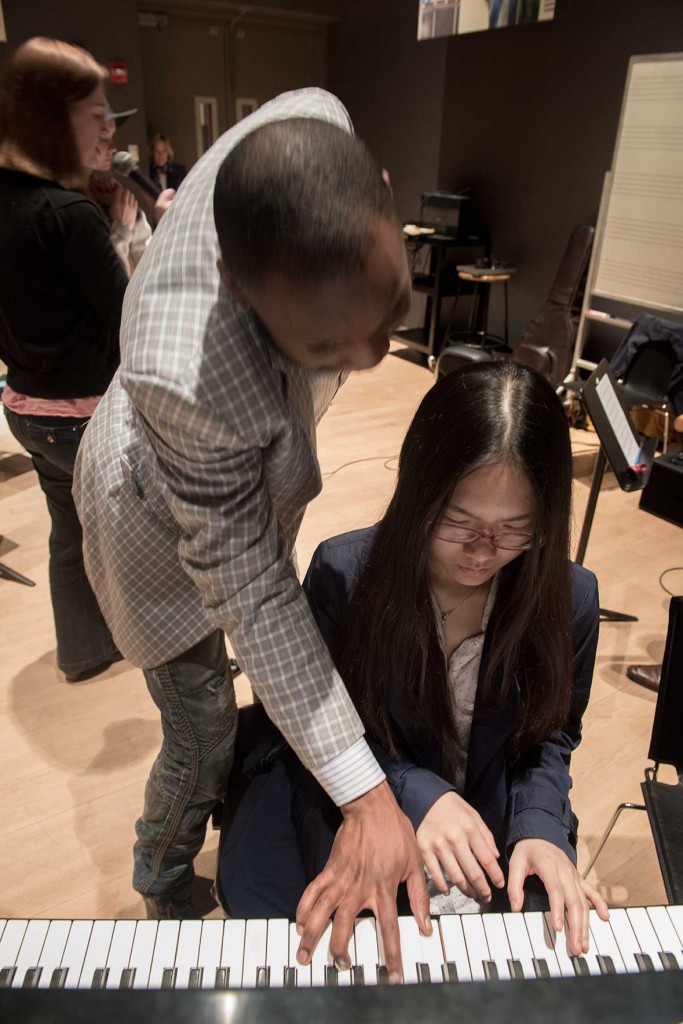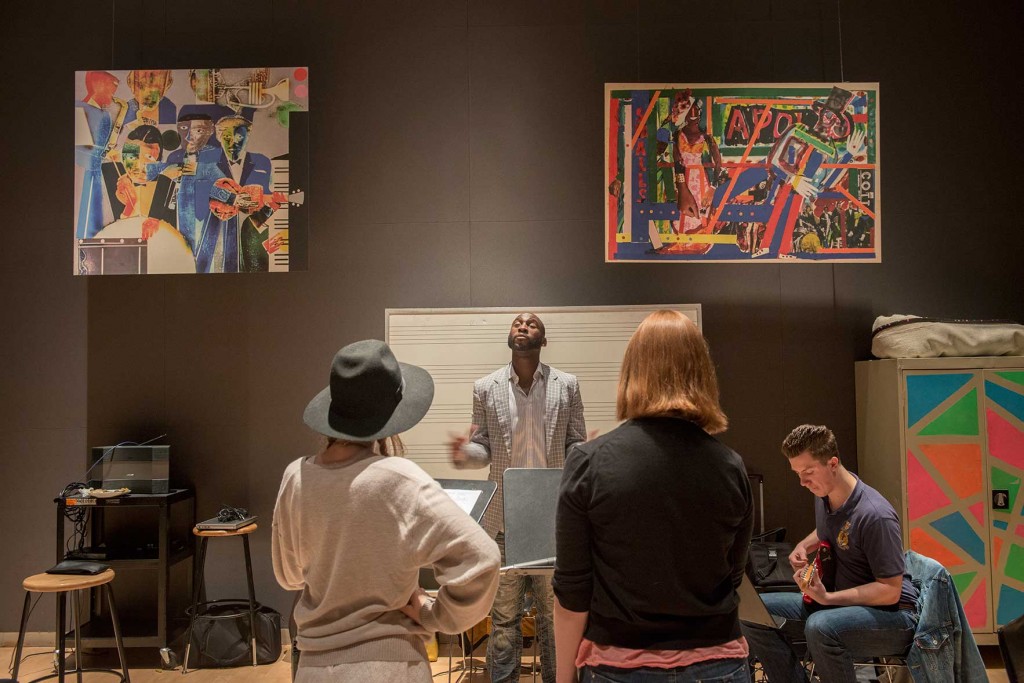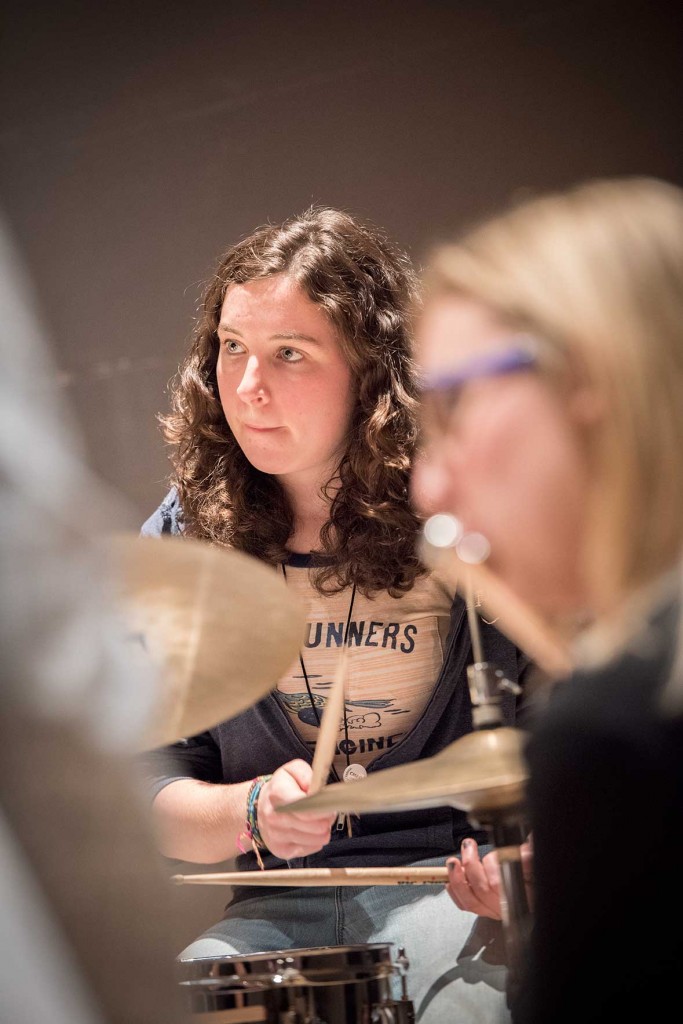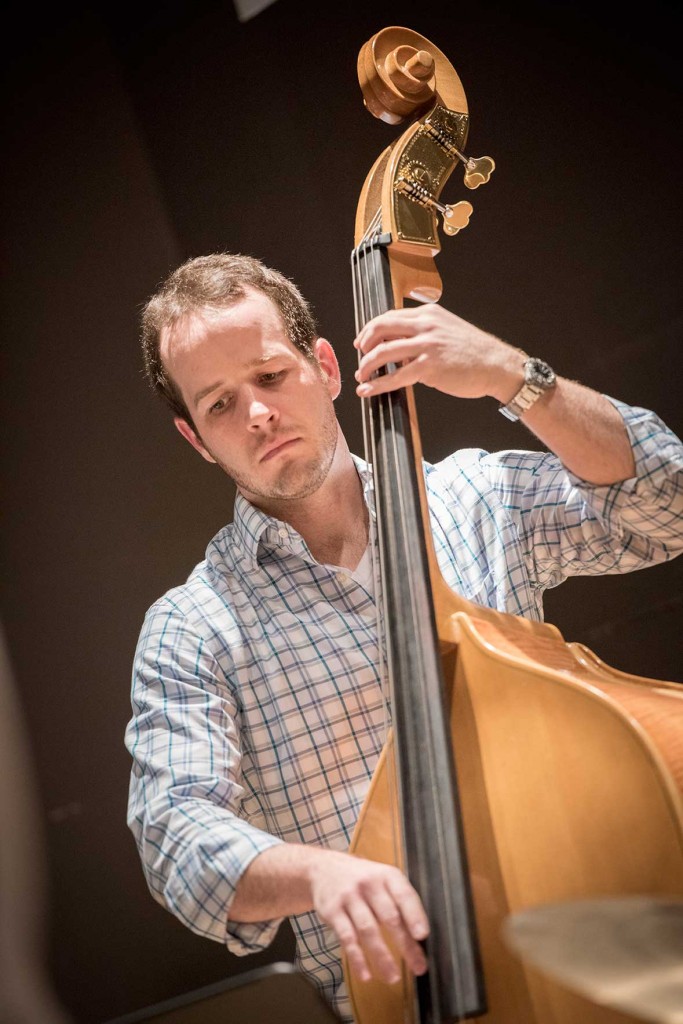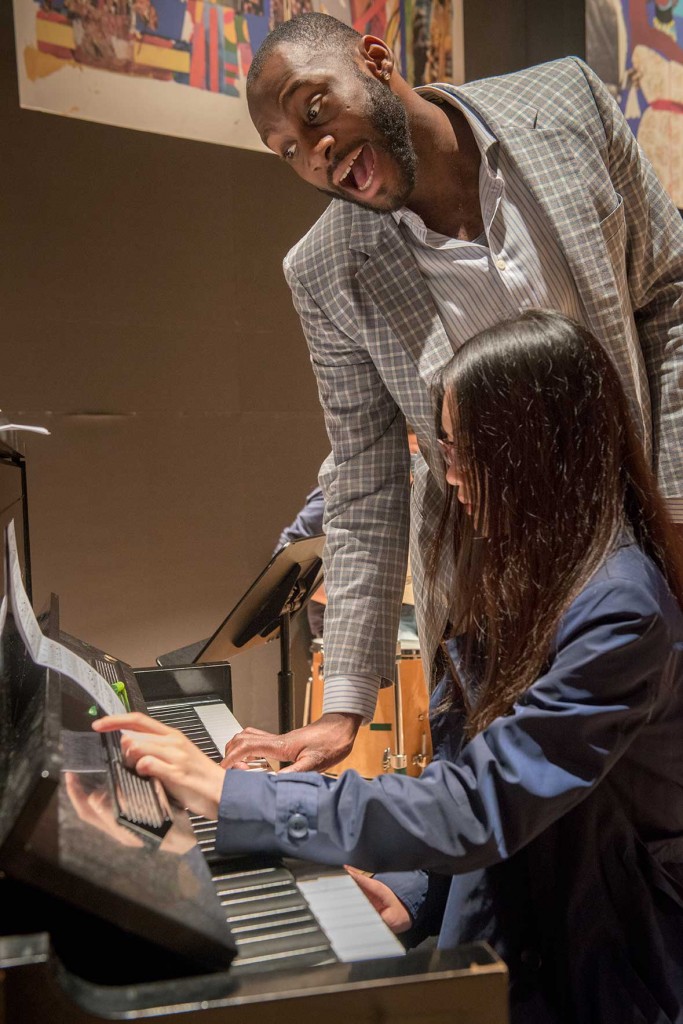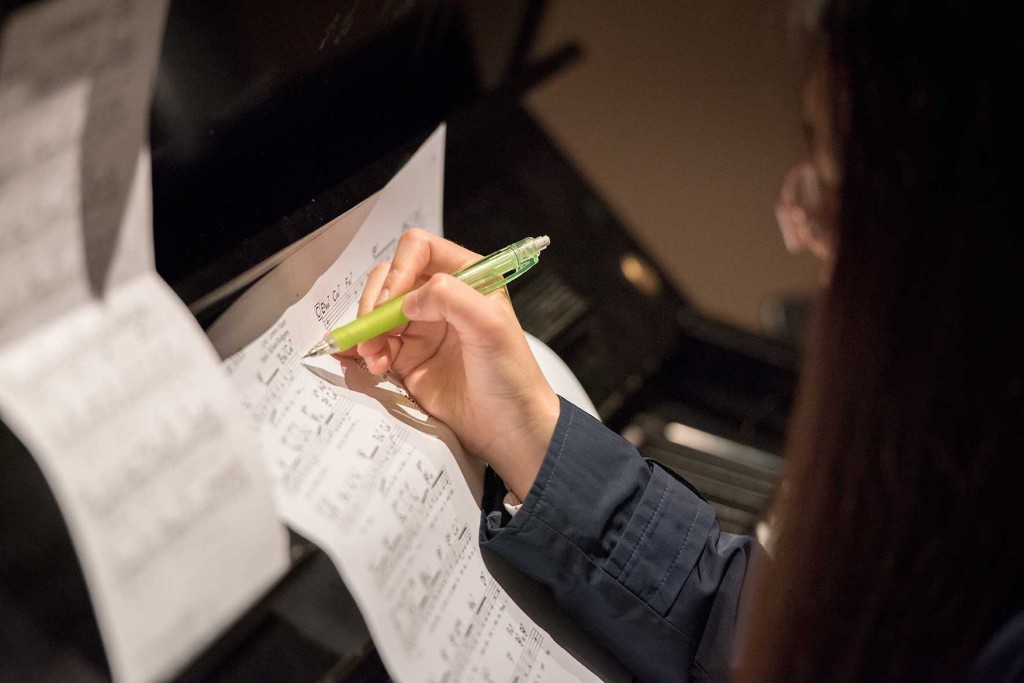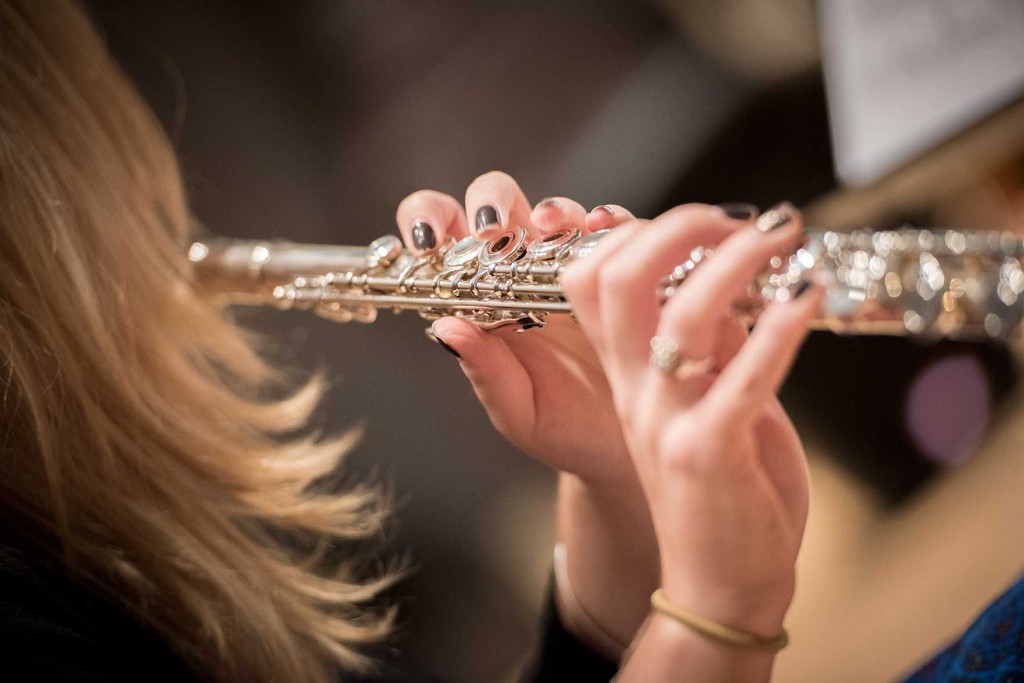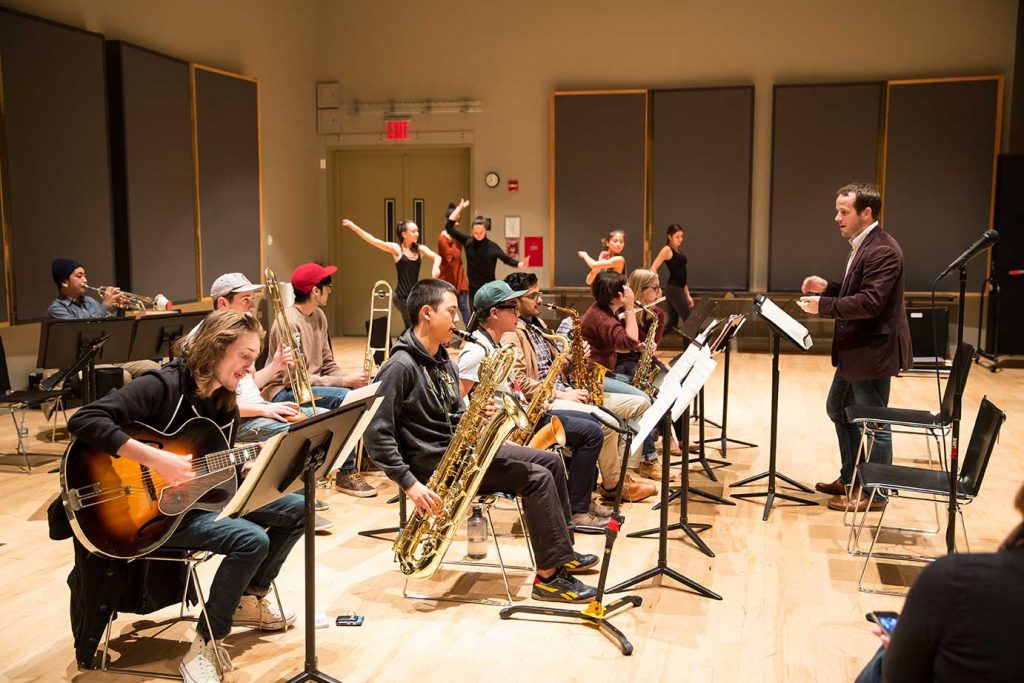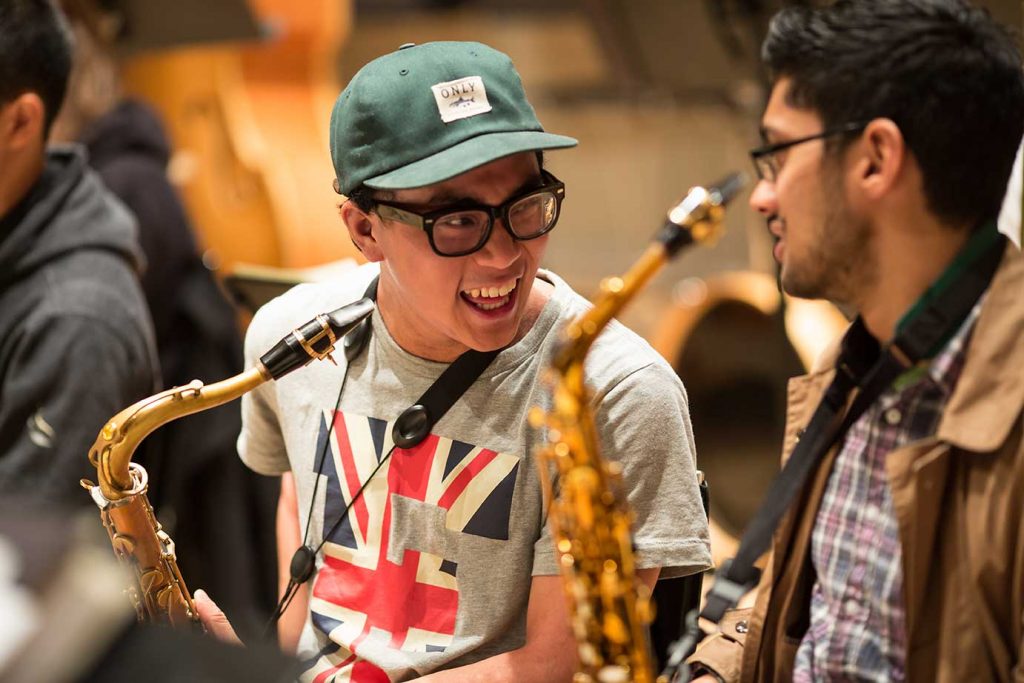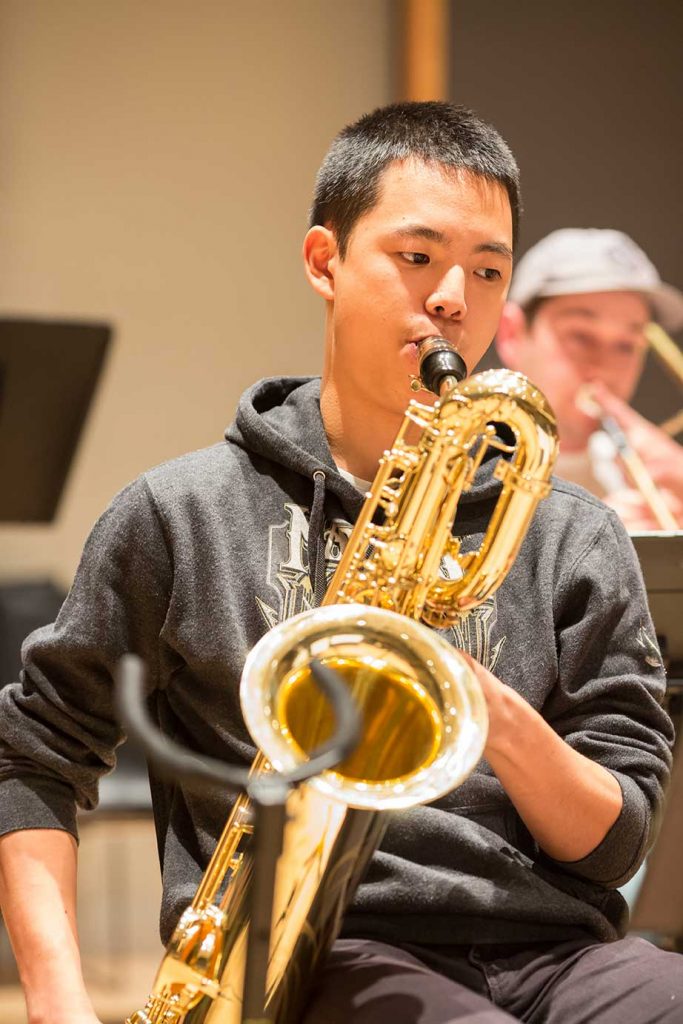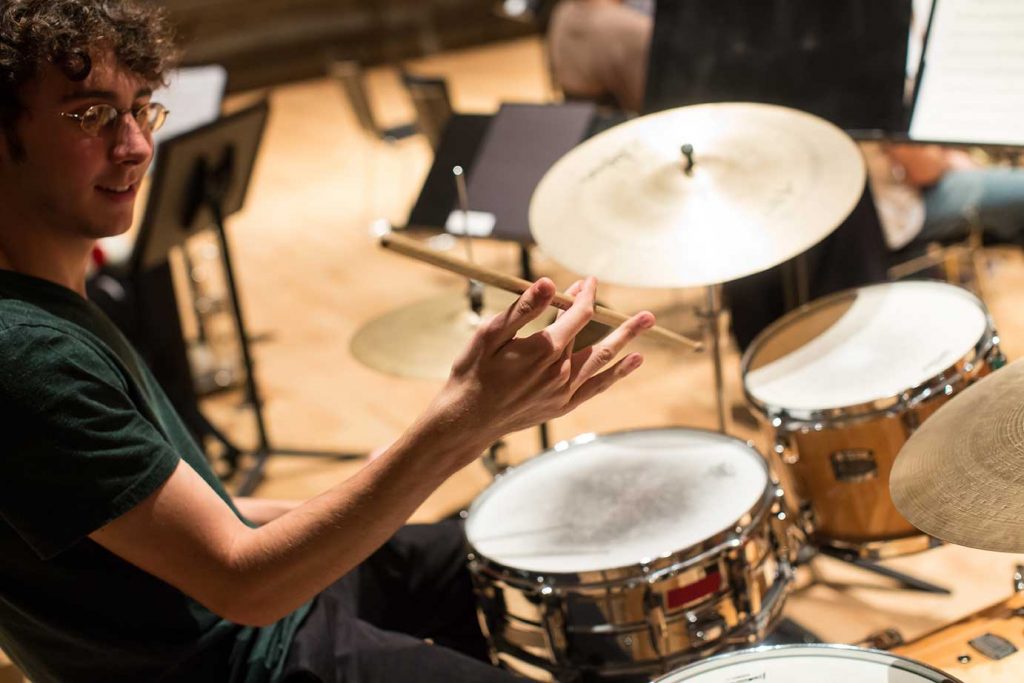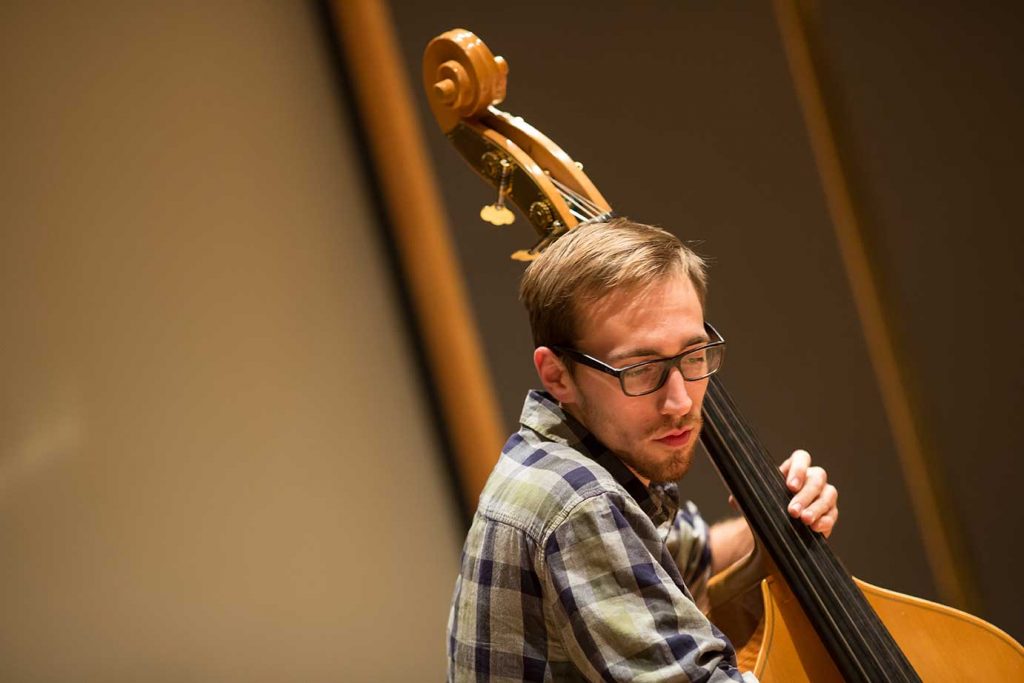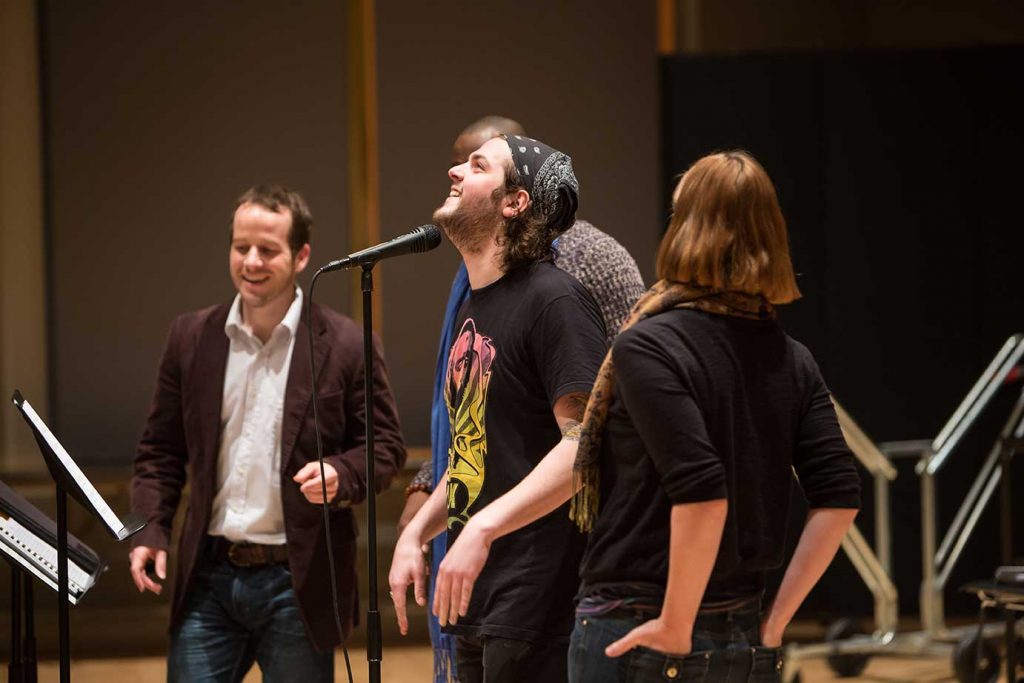“That richness of thought and perspectives really helps our work,” said Jonathan Valenti, FCLC ’98, a principal in the customer and marketing strategy practice at Deloitte.
Valenti, who majored in information science, was one of three Fordham College at Lincoln Center (FCLC) grads who participated in a Feb. 9 virtual panel titled “From FCLC to the World of Business.”
Tracyann Williams, Ph.D., assistant dean for student support and success at FCLC, moderated the discussion. She asked the panelists to share their experiences as Lincoln Center students, their tips on taking liberal arts skills into the job market, and what they like about hiring applicants with that background.
Maureen Beshar, FCLC ’86, majored in philosophy and political science, and today she is executive director of business development for the investment management firm Hardman Johnston Global Advisors. She said her Fordham Jesuit education—with its focus on well-rounded learning and being a person for others—has been valuable in her personal and professional life.
“Fordham’s [Jesuit] foundation … I really think it makes a difference in a person,” said Beshar, whose two daughters both attend Fordham and who serves on the University’s President’s Council, a group of successful alumni committed to mentoring Fordham’s future leaders, funding key initiatives, and raising the University’s profile. “It really, ethically, helped me think differently. I can attribute a lot back to Fordham, with how I treat others, how I think about situations.”
Make the Most of ‘Internship City’
Scot Hoffman, FCLC ’98, majored in English and assumed he would pursue a career in academia. But a public affairs internship at the Fresh Air Fund, which Hoffman found through Fordham’s Career Center, resulted in him becoming the organization’s director of public affairs after he graduated. He has worked in the public affairs and corporate communications field ever since, specializing in building and managing corporate reputation. Today, he is vice president and director of communications at the San Francisco-based investment firm Dodge & Cox.
“Internships are really, really important,” Hoffman told students, adding that Fordham’s location is helpful in getting that experience. “Explore what’s available to you. New York City is one of the greatest cities in the world. So many industries are represented there, [and there are]so many opportunities there.”
Blending Business Education with the Liberal Arts
The alumni panelists were joined by Robert Daly, assistant dean of the Gabelli School of Business at Lincoln Center, who discussed the opportunities for FCLC students to study things like marketing, business administration, and sustainable business by taking classes or minoring at Gabelli. He also emphasized that Gabelli undergraduates complete a liberal arts core, an example of Fordham’s faith in the value of a liberal arts education, and that he often encourages Gabelli students to consider FCLC minors like psychology to complement their business majors.
Williams said that the panelists’ perspectives were “invaluable” in helping students “understand how you may move from the liberal arts into business—that it is not necessarily a linear path, but one that is exciting.”
]]>“I got help from older students, especially my fellow Ram Van drivers, who helped guide me to the right courses and professors. The professors helped me find the right major,” he says, “and the alumni network helped lead me to the right career.”
Now Sutherland, a vice president of strategic client management at Morgan Stanley, wants to do the same for current students.
One way he does this is by encouraging more financial institutions to consider liberal arts graduates. As an economics major who minored in both political science and business administration, Sutherland says he was able to use the “critical thinking and creative problem-solving skills you learn as a liberal arts student” to succeed in his Morgan Stanley internship, which led to a full-time job offer.
In his current role, Sutherland often has to coordinate among multiple teams, something he feels Fordham prepared him well for. “You’re always challenged to find creative solutions at Fordham, to maintain a strong work ethic, and to collaborate. There are great candidates at both business schools and liberal arts colleges who can do that”
He got involved with the Young Alumni Committee’s philanthropy subcommittee and later joined the Fordham University Alumni Association (FUAA) Advisory Board, where he serves on a task force focused on Fordham’s reputation. “The way people think about Fordham is important for the student and alumni experience,” Sutherland says. “I want to be at the forefront of helping Fordham stay in the limelight.”
He also wants to help his fellow alumni reframe how they think about their place in the Fordham network. That includes telling all his fellow alumni and friends about this year’s Fordham Giving Day, which spans March 4 and 5.
“People don’t realize that the amount of donors is so important, no matter how much they give,” he says, explaining that the percentage of alumni who support Fordham is seen as a sign of just how much alumni value their Fordham degree. “If you can’t give $200, give $20, or give $2.50 instead of buying coffee,” he says. “It’s all impactful.”
More importantly, he hopes that telling his own story will inspire other alumni to donate to their alma mater. “Even with financial aid, I graduated from Fordham with a lot of debt,” Sutherland says candidly. But he says he would do it all again—the value of the degree, the friendships he made, and the network he created were worth it.
“I want to combat the negative stigma folks have about giving back when you have debt. And I want to afford other students the opportunity to go to Fordham and have these experiences with less debt,” he says. “I tell them it’s not about giving because you get something physical in return. It’s giving because when you were here, you got experiences and friendships for life.
“And if you can’t give financially, mentor a student. Hire an intern. There are other ways to give back and strengthen the Fordham network.”
Fordham Five
What are you most passionate about?
Fordham is really what I’m most passionate about. I think the opportunities that were afforded to me, the classes I got to take and the people I got to meet, it shaped my education, my career, and my life. And I’m indebted to it.
What’s the best piece of advice you’ve ever received?
There are two, both from my parents. The first is that hard work pays off. I saw that this year when I got a promotion to vice president so early on in my career. And the hard work I do personally pays off because I get to represent organizations I love, like Fordham and the Tunnel to Towers Foundation.
The other one is that you need to be able to stand up for yourself and challenge the norm. I have always tried to do that, in the classroom and the workplace, and that’s helped me get to where I am today. I always had an opinion, didn’t really sit back quietly. Even though maybe something had always been done a certain way, I let my voice be heard if I thought I could provide insightful feedback.
What’s your favorite place in New York City? In the world?
In New York City, I would say Central Park. I go up there for runs to clear my head, and it’s just so interesting that we have this green space here. It’s such a point of relief and relaxation in such a hustle-and-bustle city, especially working with finance.
In the world, it’s definitely Rome. I had a fantastic experience studying abroad there: took great classes, played on a Roman lacrosse team, built long-lasting friendships with the students I was with there from around the world. Some of my best friends are from study abroad, and I try to go back to Italy once a year.
Name a book that has had a lasting influence on you.
This is a tough one, but for a lasting influence, I think it’s The Great Gatsby, which I read in high school. What I got from it was trying to remember how precious life is, to see the true friends at hand—even though Gatsby had these huge parties, he only had one true friend in Nick—and to understand that material goods don’t fulfill your life. It’s making sure I don’t lose sight of what grounds me.
Who is the Fordham grad or professor you admire most?
Professor Booi Themeli. I took two Senior Values courses with him, so both centered on bringing the Jesuit identity and ideals and values into the classroom and into real-life situations. Those classes led to such great discussions. We would share thoughts about an opportunity or situation or problem and how we would handle it, and he would play devil’s advocate, and we would have to ask ourselves whether we were thinking about things ethically or economically, thinking about dollars and cents or the good of an organization. Those are decisions I have to make probably on a weekly basis at Morgan Stanley (whose four core values luckily align with the Jesuit identity), and Professor Themeli really drove those values home for me.
Fordham is one of 28 colleges and universities to win a Next Generation PhD matching grant, which aims to overhaul doctoral programs in the humanities to better prepare students for 21st-century job prospects within and outside of academia.
“The future of doctoral training in the humanities depends on innovative models that will deliver the competencies and skills that doctorate holders need to succeed in a variety of career pathways, in addition to traditional faculty lines,” said Eva Badowska, PhD, dean of GSAS and grant director, alongside co-director, Matthew McGowan, PhD, associate professor of classics.
“As a graduate school within a Jesuit university recognized for its strengths in the humanities, GSAS is uniquely situated to ask what it means truly to prepare our doctoral candidates for the fast-changing world of higher education and for the new knowledge economy,” Badowska said.
Historically, doctoral programs have prepared graduates solely for work in academia. However, with a 30 percent decline in academic job postings in the humanities since 2008, this singular focus is no longer realistic for students graduating from these programs.
“Thousands of professors are currently in the business of preparing thousands of graduate students for jobs that don’t exist,” Leonard Cassuto, PhD, professor of English and a collaborator on the project, said in his recent book, The Graduate School Mess: What Caused It and How We Can Fix It (Harvard University Press, 2013).
The $25,000 planning grant, to be matched by an additional $25,000 from GSAS, will not only propose rethinking Fordham’s five doctoral programs in the humanities (classics, English, history, philosophy, and theology), but will also examine what a 21st-century PhD program at any institution should encompass. For instance, what advanced transferrable skills should be taught at the doctoral level? Should skills such as collaborative teamwork and advanced digital proficiency be treated on a par with traditional emphases, such as mastery of field-specific knowledge and independent research skills?
In addition to Badowska and McGowan, the project includes a Core Planning Group and Constituent Advisory Group comprising GSAS faculty, current doctoral candidates, alumni, and community leaders who would benefit from hiring graduates with doctoral-level expertise.
At the end of the academic year, the group will produce a white paper detailing the proposed model.
“We want to rethink how we deliver the PhD at our University, but also make it scalable to other institutions and humanities programs,” said Melissa Labonte, PhD, associate dean of GSAS and associate professor of political science. “To do right by the students in these programs, we need to rethink the entire model. This planning grant will allow us to begin this process.”
A key part of the grant will address making doctoral programs in the humanities more inclusive of underrepresented, underserved, and marginalized communities, Labonte said. Within these groups, the percentage of students who enroll in a doctoral-level program has dropped precipitously in recent decades.
“We’re trying to find ways to counter this trend,” Labonte said. “This part of the grant falls very much in line with Fordham’s mission. If we’re going to embrace progressivism and social justice models, then we have to think about how PhD programs in the humanities will address the needs of people from underserved communities.”
The NEH announced the Next Generation PhD grants winners on Aug. 9 as part of $79 million in grants for 290 humanities projects and programs across the country, an initiative the group undertook to mark its 50th anniversary year.
]]>Her initiatives include GSAS Futures, a professional-development program for students, the Fellowship in Higher Education Leadership, a mentoring program for future academic leaders, as well as new master’s degree programs. She also chairs the President’s Task Force on the Future of Liberal Education.)
What’s your vision for GSAS?
Higher education is moving away from a view of the graduate school as a place solely for the future professoriate. To that end, we initiated GSAS Futures; we’ve created a position of student professional development director in GSAS; and we’re talking to faculty about how we can support students who are contemplating a different career path. It is about creating a culture in which many viable and valued options are on the table, even as we stand by our core mission to train future academics.
Another program I care deeply about is the Fellowship in Higher Education Leadership, which demystifies the workings of the University for graduate students and engages them in making decisions about policies and programs that affect them. I really wanted to convey to graduate students my own deep conviction that academic leadership is a worthwhile, meaningful intellectual engagement. There is a lot of pressure on graduate schools to prove their value proposition. I like to think that we’re protecting the university as a space for thinking and research for future generations.
How is GSAS responding to its funding challenges and the enrollment downturn affecting graduate schools?
It involves everything from developing new programs to becoming more student-oriented in supporting a variety of options for students. You cannot have top-notch PhD programs without offering fellowships and scholarships, and in order to sustain full funding for those at the PhD level, we need to build out elsewhere. What we need is more programs but meaningful programs, ones that draw on faculty expertise and that respond to what students are interested in. That calls for being very thoughtful about the use of our time and resources.
Can you tell us about some of those new programs?
We’re developing degrees that have one foot in a traditional GSAS academic experience and the other in the world of the professions. In addition to the recently approved master’s in public media—a collaboration with WFUV—and a master’s in clinical research methods, a master’s in data analytics is awaiting state approval. There’s a lot of conversation across the university about sustainability, and I would love to see a program that combines various areas from economics to biology and environmental science to policy areas—areas that are needed to have a holistic understanding of sustainable development. I would also love to see an interdisciplinary program on issues of broadly conceived security in the world, from political security to food security to climate security to cyber security. All of these are being discussed.
Did your own education offer lessons in how seemingly disparate academic fields can end up coming together?
I was seriously split between mathematics and literature in high school. I started out at the university specializing in linguistics, which at that time was highly technical; it was the heyday of Chomskian linguistics and we drew a lot of graphs; it was language but through a scientific lens. Literature for me was always about language. Personal trajectories led me away from linguistics—it had to do with how academic fields are differently structured in different countries where I was a student (Poland, the U.K., the United States). These international moves taught me a lot about how arbitrary disciplinary divisions truly are.
Has the Task Force on the Future of Liberal Education given you ideas about graduate education?
Instructors in undergraduate classrooms of the future are the graduate students of today, so we need to have conversations with our graduate students about what it means to teach in a liberal educational setting at the undergraduate level. Liberal education has historical roots in undergraduate education. But there is no conversation about how to prepare future teachers for liberal education. Fordham is committed to liberal education across the spectrum of graduate and undergraduate study, so we’re squarely on mission in sponsoring these conversations.
]]>
But if you ask Gabelli student Joseph Buccheri to go back and rethink his choice to study philosophy alongside finance, he insists, “I wouldn’t change a thing.”
He isn’t alone in making such a claim. At Fordham’s Gabelli School of Business—a place where talk of marketable skills and return-on-investment form the vernacular—there is little doubt about the value of the liberal arts. Here, courses such as philosophy, history, and theology form a central part of the business curriculum.
Buccheri, a junior at Gabelli, said he has found great value in the unlikely combination of finance and philosophy. There are the traditional upshots of studying philosophy, he said—namely, a refined writing style, critical thinking skills, an exposure to theories outside of one’s own discipline. But he was surprised to find that philosophy’s logic-based thinking style is also directly helpful for learning how to pitch a financial argument.
“Finance is less a science than it is an art,” Buccheri said. “You have to consider many different aspects when you’re building a financial model—for instance, tax rate, growth rate, discount rate, the industry in general, comparable companies, and so on—and then build an argument as to why [your model]is appropriate.”
He also sees the value—moral as well as practical—of his philosophical studies in relation to the field of finance overall.
“Businesses really need to consider how their decisions reflect who they are as a company in terms of their ethics,” he said. “People do take note of companies’ ethical decisions, which is something that could ultimately be reflected in their sales.”
Granted, there is indeed a practical upshot of centering a business curriculum on a liberal arts core, said Donna Rapaccioli, Ph.D., the dean of Fordham’s Schools of Business.
“Many technical skills necessary to get a job today will be obsolete in a few years,” said Rapaccioli. “Successful employees—and good leaders—need the ability to adapt to a rapidly changing world. They also need an ethical grounding and a nuanced worldview [to develop]one of the most important attributes any business person can possess—integrity.”
A liberal arts education is useful not just for cultivating a different kind of skillset, however, she said. She believes that the depth it adds to a student’s overall education is inherently valuable—both for the student’s personal growth and for the sake of the business environments they are entering.
“There are many good business schools and many outstanding business students,” she said. “What students get here that they may not get elsewhere is a sense of purpose… a strong idea of his or her place in the world.”
Global Business at Lincoln Center
This belief has played out in the Gabelli School’s brand new global business program based at Fordham’s Lincoln Center campus. Students take the same core courses that all Fordham students take (courses in literature, history, philosophical ethics, and fine arts, among others). Each student must then take seven additional liberal arts courses to complement his or her chosen concentration, which ultimately amounts to a minor in a liberal arts discipline.
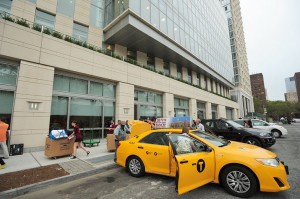
(Photo by Chris Taggart)
The idea, said Vin DeCola, S.J., assistant dean for Gabelli School of Business at Lincoln Center, is that students understand not just the what of their business education, but the what for.
“Courses in anthropology and psychology might help a marketing student to understand consumer behavior and the global marketplace,” Father DeCola said. “Similarly, the management degree with a focus on healthcare would invite taking science classes for a more direct grounding in the science behind the health industry.”
In terms of a traditional business curriculum, some of the program’s requirements—such as calculus or macroeconomics—are not so unconventional. What makes the Gabelli School unique, Father DeCola said, is the idea that even the humanities have an important role to play in business instruction.
“Theology, for instance, helps in understanding the belief structures that are embodied in many different places in the world,” he said. “If you’re doing business on a global level it’s important to know faith traditions behind the countries you’ll be interacting with.
“The idea here is that because this is a global business program, a broad knowledge of the world is important in order to read the signs of the times and understand the trends going forward.”
“Morally speaking, it is quite simply Fordham’s responsibility to educate the whole person,” Rapaccioli said. “We ask our students to be a part of Fordham’s culture, which stresses classical liberal education, because we want our graduates to be compassionate and ethical global leaders, not just highly skilled accountants, financiers, or marketers.
“We cannot simply pay lip service here to ethics and the greater good. We have to live it. Hundreds of years of history demand that of us. That tradition is worth something.”
]]>The partnership, which is part of the college’s effort to enhance its music major, has students practicing in a space next to Dizzy’s Club Coca-Cola. Matt Buttermann, teaching artist and program manager for instruction-based education programs at JALC, said that’s enabled them to bring in performing artists to work with the students before or after their sets at Dizzy’s.
Members of the chamber jazz ensembles performed two sets from their current repertoire on Nov. 8 at JALC’s Ertegun Atrium prior to performances of “Celebrating Bobby Hutcherson: Life of a Legend.”
On Monday, Dec. 8, Fordham Jazz Night, all jazz chamber ensembles, the jazz orchestra, and the guitar ensemble will perform at 5:30 p.m. at the Irene Diamond Education Center, along with guest artists and a contingent of Fordham dancers.
—Photos by Chris Shinn, Kathryn Gamble and Rick Lozier
]]>
Deavere Smith, known for her roles on TV’s The West Wing and Nurse Jackie, transformed into a short, fast-talking, Brooklyn-accented, brilliant, and compassionate physician. That’s Dr. Peggy Bia, who says the actress exaggerated the Brooklyn accent.
Despite Bia’s quibbles, the question Deavere Smith said drove her show—“How do we pursue grace and kindness in a competitive and sometimes distressing world?”—mirrors Bia’s own mission as a medical educator and caregiver.
Long before she was spearheading a new way to teach Yale medical students and long before she was one of few women entering medical school, Bia was paving a path for undergraduate women at Fordham. She was a member of the first class of the all-female Thomas More College, which opened its doors at Fordham 50 years ago this fall.
Bia credits her liberal education—science courses in addition to theology and philosophy—and Fordham’s commitment to community service for molding her into the kind of doctor she has become.
“She’s a dynamo,” says Nancy Angoff, M.D., associate dean of student affairs at Yale Medical School. “She’s tough and gets things done, but it comes from a place of compassion and caring. That’s really what permeated her program in the teaching of clinical skills. This love of being a doctor was so picked up by the students.”
Bia grew up in Brooklyn, the middle child of seven siblings. Her father died when she was 11. Her mother took in foster children to make ends meet. She also took in cousins when they needed a place to stay. “There were always tons of babies in my childhood,” Bia recalls.
She went to an all-girls Catholic high school and met her future husband, Frank Bia, M.D. (FCRH ’67), during socials with the all-boys Catholic school he attended. They’ve been together ever since. She started at Thomas More College when he was a sophomore at Fordham.
Frank always knew he wanted to be a doctor, but Peggy hadn’t considered medicine as an option for women initially. Most of her many female relatives became missionaries, teachers, nurses, or nuns. (One of her sisters is a Sister: Elizabeth Johnson C.S.J., distinguished professor of theology at Fordham.) Bia knew those careers weren’t for her. She toyed with becoming a chemist, but, as she puts it, “I didn’t want to spend my days with test tubes.”
Her pre-med adviser at Thomas More, chemistry professor Frederick Dillemuth, S.J., encouraged her to go to medical school. At the time, she had little confidence in her abilities, but Father Dillemuth and Frank insisted she could handle the work. After she graduated from Fordham summa cum laude in 1968, Peggy and Frank were married at the University Church, with Father Dillemuth presiding. They went to Weill Cornell Medical School and did their residencies at the University of Pennsylvania before earning fellowships to Yale, where they joined the faculty in 1978. They now have two grown sons, each in graduate school.
Bia says she chose to specialize in nephrology because during her residency “the best and most fabulous teachers were nephrologists.” Besides mastering complex renal physiology and caring for kidney transplant patients, she has been a caregiver for her medical students.
She worried at one time that they were not getting the clinical skills to be good, caring doctors. So 15 years ago, she developed a program that emphasizes mentoring. First-year medical students are connected with a physician to help them practice taking medical histories and performing physical exams on patients. They also attend weekly sessions where these skills are practiced in a safe setting.
“There is so much unhappiness in medicine in this day and age,” Bia says. “Finding the joy in practice is a lot harder now than it was years ago. I wanted my medical students to find that joy.”
Despite the complexities of today’s healthcare system, Bia wants to ensure that her students become keen diagnosticians and expert caregivers who form bonds with their patients, listening carefully to their stories. She believes the altruism woven into the Fordham curriculum helped to shape her view of medical practice.
Around Yale, students perceive Bia as tough yet tender—and not without a healthy sense of humor. Indeed, besides being mimicked at the Long Wharf, she’s been lovingly impersonated by her students. Last spring, at a reception for her when she stepped down from leading the clinical skills program, four students donned big blond wigs and took to the podium, each one claiming to be the real “Doctah Bia.”
Although Bia no longer runs the program she founded, she’s still a full-time faculty member in the renal section, lecturing and running workshops on kidney function for medical students, nursing students, and fellows.
“I grew up with this very Catholic spirit that fostered community service,” she says. “I was teaching younger kids since I was in eighth grade, and a group of us taught math and science to underprivileged high school students when I was at Fordham, so that whole aspect of service was really, really emphasized, and I savored it. It definitely informed what I felt I wanted to do with my life.”
Bia may have grimaced at Anna Deavere Smith’s rendition of her, but perhaps the audience grasped what being Dr. Bia really means. Which is also how Deavere Smith once described the central point of her entire show: to pursue and “find grace in the face of a complex world.”
Or, as Frank Bia once put it to a graduating class of medical students, the message Peggy Bia has been transmitting for years is this: The key to a happy, fulfilling career is “listening to and with one’s heart and using one’s hands to both diagnose and touch another person’s life.”
Maybe that’s why everyone wants to imitate Peggy Bia, on and off the stage.
—Randi Hutter Epstein, M.D., is one of Peggy Bia’s former students at Yale. She’s a freelance medical journalist and the author of Get Me Out: A History of Childbirth from the Garden of Eden to the Sperm Bank (Norton, 2010).
]]>In response, Fordham has launched an effort to deeply examine liberal arts education and articulate its value for students. At the request of Joseph M. McShane, S.J., president of Fordham, Stephen Freedman, Ph.D., provost of the University, convened the Fordham Task Force on the Future of Liberal Arts Education.
Freedman tapped Eva Badowska, Ph.D., now acting dean of the Graduate School of Arts and Sciences, to chair the task force; she invited representatives from across the University to take part. Badowska said members are grappling with how to address the liberal arts, given the businesslike language that more people are applying to higher education.
“There’s this perception [among academics]of the language of the market, which is ‘bad,’ and the language of the academy, which is ‘good,’” said Badowska, who is also an associate professor of English. “There’s a strong concern we will fall into the trap of speaking about the value of a liberal education using market terms, and in doing so, cheapen the discourse.”
President Obama’s concentration on higher education came as the country emerged from the fallout of the 2008 financial crisis. As a result, business terms such as “value,” “results,” and “skills” have worked their way into the debate about higher education’s future.
“What executives want from graduates are the softer skills of liberal arts, not just technical skills,” said Badowska. “So we debated how what we teach could be labeled ‘skills.’ In some sense we can say what we teach are ‘transferable skills,’ ‘high-level skills,’ ‘intellectual skills,’ or even ‘habits of mind.’”
The task force has defined just a few of those softer skills as being able to analyze problems from several angles using distinct processes like the analytic and scientific methods. Other soft skills include writing and presentation skills and having a broad historical awareness of the world and its peoples.
The return-on-investment mindset was highlighted in January when President Obama told some General Electric factory workers that “folks can make a lot more potentially with skilled manufacturing or the trades than they might with an art history degree.” (The president, who was educated at two distinguished liberal arts colleges, Occidental and Columbia, later apologized for his remarks.)
“There is a prejudice that liberal education is a matter for expensive private colleges and doesn’t easily translate into careers,” said Badowska.
Several on the Fordham task force have noted that “liberal education” once denoted freedom from the manual labor of vocational trades. Members agreed that today this idea would be seen as a slight. In an attempt to recast the debate, liberal arts promoters have adopted some of the terms used to promote vocational training, such as “skills.”
Badowska said that “skills” has become a source of tension not just for the Fordham task force, but for liberal arts promoters in general, igniting a debate about how the word should be used.
“There’s been such a push toward assessment that whenever faculty hear the word ‘skills,’ there’s a kind of knee-jerk reaction: ‘Here comes assessment again,’” she said.
Nevertheless, she said, liberal arts colleges have begun to embrace this term in order to make a liberal arts degree understandable and valuable to a job-seeking public.
While Badowska said that the term “skills” continues to “wreak havoc with liberal arts,” she said it also shows the need for a better communication strategy. She paraphrased Father McShane, saying that liberal arts professors need to be “bilingual.”
“Liberal arts professors have to be able to speak the academic language that ensures intellectual credibility, but they also have to speak the language of the public debate—which is often the language of dollars and cents.”
Badowska said that to address this concern, the task force has made public relations a primary goal.
“The story in the news right now is ‘who can afford liberal education?’” she said. “It’s becoming patently clear that we are facing a future in which the few people who will be able to afford to attend liberal colleges will be the rich.”
So while the bulk of the task force’s work is to articulate the value of a liberal arts education, Badowska said that developing a strategy to advocate for the liberal arts would be just as important.
Social media and web presence strategies are being developed to ensure that the academic work of the task force (several papers are expected to emerge from the effort) will not gather dust on a library shelf, but become the basis for the University to actively participate in the national debate online.
Badowska said the task force’s discussions have been freewheeling and open-ended. She is well aware that faculty often view such efforts as idealistic at best, but she thinks the task force’s academic work will find broad support and exert influence on the shape of the liberal arts at Fordham.
The task force expects to unveil the results of its efforts by the end of the academic year.
]]>What excites you the most about your appointment?
Working for Fordham is really exciting. I think what’s very exciting is all the potential of the London Centre. It’s been growing quite quickly over the last few years, and there’s potential for more growth there, to make it into a truly global program.
Is there any particular growth area that you’re going to focus?
The largest of the three programs is the Gabelli School of Business, so I certainly want to pay attention with what’s going on there. But we also want to look at the London Dramatic Academy and see what resources they need. With liberal arts, we need to be mindful of our relationship with the University of London, and I want to make sure that where I am able to visit all those places where our students are studying. They don’t necessarily study with us; they study on the various campuses of the University of London. That’s exciting, but we want to make sure we have a handle on that.
We also have a lot of special programs. The Graduate School of Social Service has a program, and there are a number of others that are bringing people over for short stays. Are there opportunities for us to expand those kinds of programs and open up London for people who might not have a chance otherwise to go?
What are your goals?
The first goal is to make sure that what happens at London is best for Fordham and best for our students, whether they’re undergraduates or graduates, and the experience helps them understand the global reality that we’re in. American students tend to be a bit myopic in terms of the world. When they get onto campus, they live in that bubble, and they don’t watch the news or read a newspaper. To get our students into a truly global environment, and get them to understand that the world is bigger than New York or wherever they’re from, is important.
As we expand the program, I also want to work collaboratively with the other 27 U.S. Jesuit colleges, so they can send their students to London. We have some agreements now, but it’s a small number. We have a great opportunity to expand that number and really open up London not only to Fordham students, but to students at other Jesuit colleges.
What do you anticipate will be your biggest challenge?
There are a lot of moving parts to running the Fordham London Centre. The programs have some synergy, but there’s some independence in how they do it. So the challenge is, how do we make sure that all of them still carry the Fordham Jesuit educational stamp?
Why is it so important to be in London right now?
London is a world capital for culture and finance. Certainly Paris has a claim on culture, and you would also look at Germany and Italy, but in London, there are so many firms for finance and theaters in the vibrant west end that are right at our doorstep. I also hope to use London as a jumping point to travel to places like Rome, Berlin, Brussels, and engage our students in other EU capitals.
You oversaw the opening of a center in Bologna, Italy when you were the president of Spring Hill College. What lessons did you take from that experience?
We provide numerous student services here on our campuses, so students come to expect a certain amount of support and service. So part of what we need to be mindful of is how we are supporting our students outside of the classroom, and giving them places to study, places to interact, and opportunities to form community while they’re over there.
London’s program is kind of falling into that, so we need to be a little more intentional now that we’re growing, and make sure students are supported and have a good experience. Our academic program is strong, and we’ve got excellent faculty that we hire and bring over from New York. But we also need to mindful of all the other things that happen with our students outside of the classroom, much like we do here in the states.
What are our housing arrangements? Are they conducive to the experience we’re hoping they’re going to have? What kind of support services are there should there be problems? We have arrangements with some of the other bigger universities in London to access their staff, should we need to do that. But as the program grows, we may need our own staff to address those things. I’m a student affairs person, so I approach things from that perspective.
Contact: Patrick Verel
(212) 636-7790
[email protected]
Born in Prague, Czechoslovakia, Stadler received her doctoral degree in French from Columbia University in 1967. She taught French and German at Manhattan Community College, where she also served as head of the division of liberal arts, deputy chair of the Department of Modern Languages, and director of language laboratories.
She joined Fordham’s Liberal Arts College—now Fordham College at Lincoln Center—in 1968, the year the college was founded. A year later, she was appointed chair of the Department of Modern and Classical Languages, and later became the chair of the Division of Humanities. She was instrumental in creating the comparative literature major and the media studies program. In 1983, she joined forces with the Film Society of Lincoln Center and the annual New York Film Festival to launch a course on contemporary filmmakers.
“Eva Stadler had a genius for program building. In the early years of the College at Lincoln Center, she shaped the interdisciplinary Humanities Division and helped it develop into a strong and collegial unit,” said Anne Hoffman, Ph.D., professor of English. “Eva was deeply committed to interdisciplinary research and coursework. In her years of service as chair, as member of innumerable hiring committees, and at times of institutional change, Eva could always be counted on to supply the vision that is vital to curricular innovation.”
During her time at Fordham, Stadler was affiliated with both the Department of Communication and Media Studies and the Department of English. In addition to teaching graduate students and serving on doctoral dissertation committees, she was the director of literary studies for nine years before retiring in 2009. She was granted emerita status shortly thereafter.
She was a two-time Bene Merenti award-winner, having received it first in 1988 for 20 years of service to the University and again in 2008 for 40 years of service.
“[She helped lead a] devoted, tireless, and selfless effort to build up a viable institution,” said Lawrence Kramer, Ph.D., Distinguished Professor of English. “She was a real community-builder and a personal model of generosity and intellectual adventurousness.”
She is survived by her husband of many years, Richard Brooks.
A memorial service will be held on the Lincoln Center campus this fall. Details to follow.
Contact: Joanna Klimaski Mercuri
(212) 636-7175
[email protected]
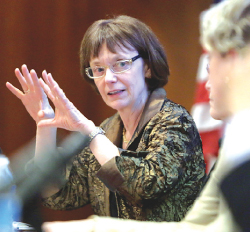
Photo by Bruce Gilbert
Fordham’s Center for Ethics Education’s April 28 symposium, “The Value of a Liberal Arts Education and America’s Future,” focused on the national scrutiny on liberal arts.
“If the public agrees about anything, its about dollars and cents, cost and outcome,” said Eva Badowska, Ph.D., associate dean for academic programs at the Graduate School of Arts and Sciences and and chair of Fordham’s Task Force on the Future of Liberal Education.
Both Badowska and panelist Rebecca Chopp, president of Swarthmore College, said the liberal arts community must promote the transferable skills of liberal arts. Chopp said that the traditional narrative that a liberal arts education creates a well-rounded individual is not enough to sell it today, and “we need to speak powerfully to the existential needs of the workforce.”
She framed the conversation as it relates to today’s students, the Millennials: While Millennials are confident, engaged, and opinionated—skills that play out well online—their interpersonal skills are often left wanting.
“The students don’t know the basic rules of communication,” she said. “This is one of the great crises in America.”
She said such problems could be mitigated by skills learned on residential liberal arts campuses, where delivery of knowledge could include community and “associative living.”
Jamienne Studley, acting under secretary of the U.S. Department of Education, said learning and living together at a liberal arts college is invaluable for the online generation, noting that “even Google has a campus.”
Trumpeting job outcomes, said Colorado College President Jill Tiefenthaler, Ph.D., often shifts the public focus toward STEM and professional degrees, which then are perceived by the public as more worthy of investment.
“We need to remind the public that a liberal arts education’s sum total far exceeds a job title,” she said.
A by-the-numbers study was presented by Richard Vedder, Ph.D., director of the Center for College Affordability and Accountability. While an accounting graduate may come out of the gate making $45,300 versus $39,700 for a liberal arts graduate, by midcareer philosophy majors’ incomes exceed accounting majors’ by $3,500.
Likewise, Vedder said the study shows that history majors leave their organizational management major counterparts “in the dust.”
“Liberal arts majors pull ahead a few years after graduation,” he said. “They know how to think better. They are more literate. They can better analyze unique situations and react better. Reading about King Lear, or the American south before the Civil War, subliminally helps them think critically.”
Andrew Delbanco, Ph.D., professor of humanities at Columbia University, said that liberal-arts-bashing is not a recent phenomenon. Quoting Abigail Adams’ “education has never been worse than it is now,” Delbanco said that the liberal arts have always been in trouble.
But the preservation of a liberal arts education in the public and private sectors preserves a society where “young people can decide what they want to become rather than submit to some predetermined position that’s been handed to them.”
“In that sense nothing is more fundamentally American than [a]liberal education.”
The evening represented a culminating event for the work of Fordham’s task force, said Badowska.
